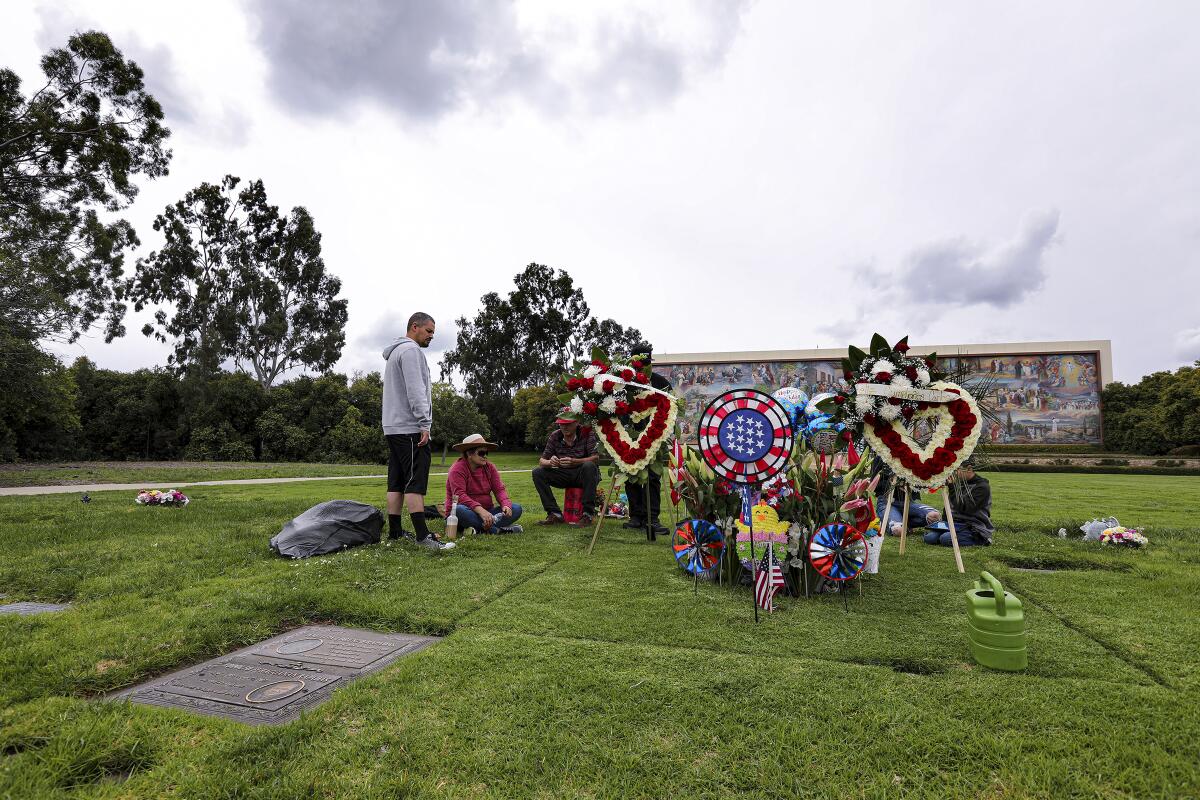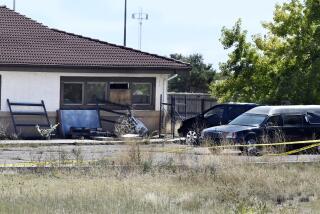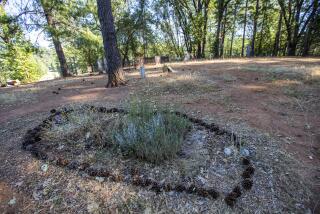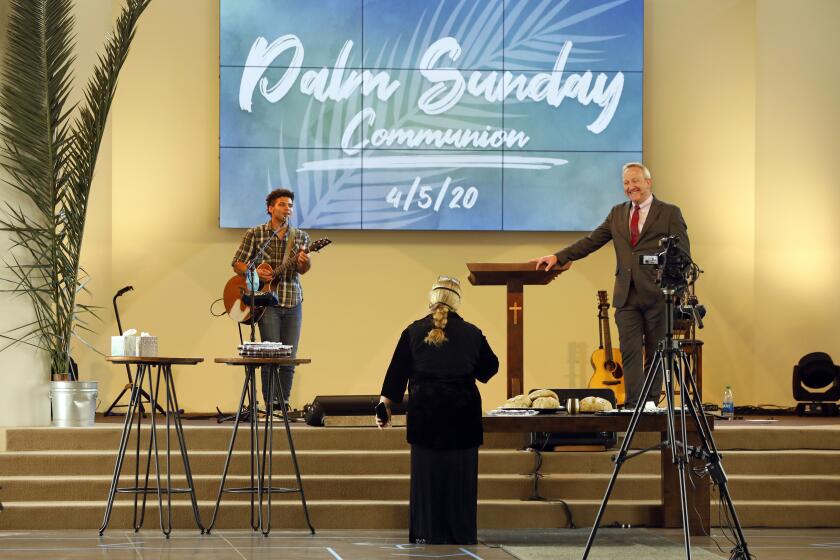How can you grieve without a funeral? As coronavirus restrictions grow, families make heartbreaking choices

As her father lay dying of congestive heart failure this month, Mary Jo Dixon asked what kind of funeral he wanted.
Glenn Wilson, 78, asked for old-fashioned hymns. “In the Garden” sung by Andy Griffith. “The Old Rugged Cross” by Alan Jackson. Please finish the service, he requested, with “Amazing Grace.”
For the record:
3:51 p.m. March 20, 2020An earlier version of this article quoted Mary Jo Dixon as saying, “My worst fear came through today.” She actually said: “My worst fear came true today.”
His Baptist pastor would officiate. He did not want to be cremated. He had already paid for a cemetery plot.
Dixon scribbled the requests in a spiral notebook with the words “Blessed Beyond Measure” on the cover. What a blessing, indeed, she thought, to be able to plan it with him during the month he was in hospice care.
Wilson died at home in Marysville, Wash., on Sunday. His large family — he was one of 12 children and had four daughters, each with her own children — hoped for a funeral Saturday.
But this week, amid dramatic efforts to stop the novel coronavirus, everyone in the country was urged to stay home. President Trump warned against gatherings of more than 10 people. Which includes funerals.
What followed for Wilson’s family were the kind of heartrending decisions about his funeral — How do you choose the few people who can attend? Can it be postponed? Should it be livestreamed? — that will become increasingly common for Americans in this uncertain new world of COVID-19.
“Honestly, I’m not sure I’m going to be able to honor my dad’s wishes,” Dixon said Tuesday, her voice cracking.
On Monday, the day after her father’s death, the funeral director called and said that the planned service, with 150 or so people, could not happen and that they should consider a 25-person limit. Dixon couldn’t imagine turning loved ones away.
She considered postponing, hoping the restrictions would lift soon. But with escalating orders against public life seemingly every hour, that hope quickly faded. Her father’s body was at the funeral home, and she knew that his remains could be preserved for only so long.
“We do realize that it’s a very real situation, so it’s not like we’re not in tune with what’s going on,” Dixon said Tuesday. “However, it’s my dad, and I want to honor him. ... I’m having huge anxiety because I can’t make plans just yet.”
Across the country, funeral directors said the rapid spread of the disease and shutdowns of public gatherings had upended their work and left grieving families at a loss.
Many directors refused to hold funeral services in chapels or offered to only do small graveside burials limited to 10 people. Others switched from open-casket viewings to broadcasting video streams of services with bodies of loved ones out of sight.
“This is a whole new terrain,” said Amy Cunningham, a Brooklyn-based funeral director who runs Fitting Tribute Funeral Services. At a Jewish funeral home where she frequently works, Sherman’s Flatbush Memorial Chapel, most traditional services were canceled this week.
“It leaves the family with few choices, one being to just sign authorization forms and give your permission to have a body cremated with no service,” Cunningham said.
She is giving families the option to have a funeral with just a casket and officiant — with anybody else watching live via video stream, separately in their own cars, before heading to a graveside service where everyone stands 6 feet apart.
This week, the Centers for Disease Control and Prevention recommended livestreaming funerals and limiting physical attendance to immediate family.
The CDC says that there is no known risk associated with being in the same room with the body of someone who died from COVID-19 and that those bodies can be safely buried or cremated. People should, however, avoid kissing them.
The CDC advised funeral directors and those who touch the bodies of people who died from the coronavirus to wear protective equipment, including disposable gloves.
Some funeral directors have resorted to double-bagging bodies, using masks and wiping down body bags, even for those who have died of causes other than the coronavirus, said Walker Posey, a spokesman for the National Funeral Directors Assn., an industry group.
“I have two services coming up where they were going to be big and public, but no longer,” said Posey, a fourth-generation funeral director at Posey Funeral Directors in North Augusta, S.C.
“The families decided to slash and postpone the big-service invites and make what’s happening now private. Considering everything going on, it’s not a bad idea,” Posey said. “You get a chance to grieve a death and then have a positive gathering months later, when things slow down, to remember your loved one.”
In Dougherty County, Ga., public health officials took the extraordinary step Tuesday of naming two men whose recent funerals were believed to have been events where the virus was spread. The funerals, in separate churches, were handled by the same Albany funeral home.
Dougherty County Coroner Michael Fowler told The Times on Wednesday that there have been at least three deaths connected to the funerals in which the coronavirus is suspected.
The grieving process has already changed around the globe. In hard-hit Italy, where newspapers have been forced to add more space for obituaries, crematoriums have been running 24 hours a day, and services are taking place with only an officiant and a funeral home employee.
In California, where there had been 19 deaths linked to the virus as of Thursday afternoon, storage of bodies is not currently a problem, said Bob Achermann, executive director of the California Funeral Directors Assn. But storage “is not inexhaustible,” he said.
People, he said, will have to get used to virtual funerals if the restrictions stretch on for weeks or months, as seems likely.
Despite the adjustments, Achermann added, “life goes on. Death goes on.”
At Forest Lawn, which operates six memorial parks and five planning centers across Southern California, funerals are currently limited to 10 people, with free livestreaming, and cleaning protocols have been enhanced, spokesman Tom Smith said. For livestreamed services, there are no closeups of bodies, he said.
Families, Smith said, have been remarkably understanding.
“It’s not like what I run into when I go to Ralphs, which is crazy time,” he said, referencing hoarding and crowds at local supermarkets. “Here, people’s manners have been lovely, between the guests, who are going through a very difficult time and are coming here and being great, and our employees being incredibly sympathetic and understanding.”
Char Barrett runs A Sacred Moment funeral service in Everett, Wash., in the Seattle area, which has been hit hard by the virus. She said the small things have been the hardest.
When a grieving family comes into her office, she no longer has chocolate chip cookies and hot chocolate out for them because of restrictions on businesses that serve food.
“Those cookies are comfort,” she said. “That is part of our job, to help people feel just a little better in the worst week of their lives. It’s getting harder.”
Barrett has been handling the service for Glenn Wilson.
After three days of uncertainty, she was able to give the family good news on Wednesday: They could have a graveside burial service on Saturday with 50 people, since it would be outdoors. Barrett planned to send five employees to enforce 6 feet of separation among attendees, give sanitizing wipes to each family member and post signs around the cemetery about social distancing.
But plans quickly changed, again. Late Thursday, Barrett learned that the state of Washington had banned funerals as “nonessential services” and that interments would be limited to “delivery only.”
Barrett called Dixon with the bad news Friday morning: Wilson’s graveside service was canceled.
“My worst fear came true today,” Dixon said.
Wilson’s body remained at the funeral home. The family holds out hope for a small service in the coming weeks, with a much bigger memorial later. But everything is in limbo.
Dixon’s father, a truck driver and quiet, “gentle soul,” was in hospice care at home for a month.
At one point, Dixon, who had not been out of the house for days, ventured out to get toilet paper. She tried three stores before ending up at a Walmart where there were still no rolls.
Standing in line behind a woman with a pack of Angel Soft, she told the woman that she was lucky to find toilet paper — that her dad was home dying and they couldn’t find any. The woman gave the package to her.
“I said, ‘Oh, you are my angel today,’” Dixon said. “It just shows you how kind people can be. That would have been my dad.”
As the funeral plans kept changing, Dixon tried to explain to her mother, who has dementia. Sometimes she understood. Sometimes she did not, and ventured to the room where he died, looking for him. In the difficult days after his death, Dixon tried to calm her mother with reruns of “The Andy Griffith Show” on Netflix.
On Friday, Dixon said, her mother asked her: “When’s your dad going to be back?”
Dixon explained that he had died. Her mother wept. “He was the best person I have ever known in my whole life,” she kept saying.
Glenn and Louise Wilson would have been married 60 years this summer. They met when she was 13 and he was 14. He was fixing a car in a gas station parking lot, and she rode up on a horse.
He told a hospice nurse just before his death that, somehow, they ended up at a dance together.
“We went to that dance,” he said, “And we danced all night, and I never wanted to let her go, ever.”
More to Read
Sign up for Essential California
The most important California stories and recommendations in your inbox every morning.
You may occasionally receive promotional content from the Los Angeles Times.













